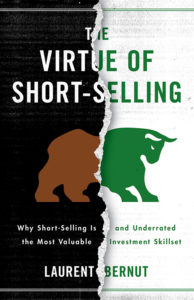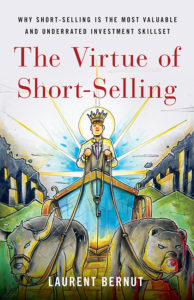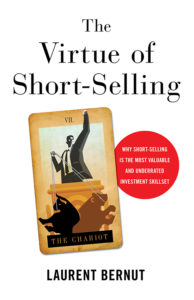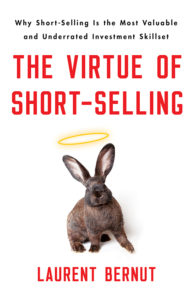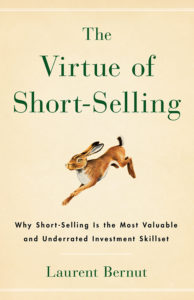Our Research
The world does not need yet another market commentator. Our tools are designed to help investors along their investment journey
- Signals: trend reversal signals (Bull/Bear) on equity indices, Forex and government bonds
- Trading systems: simple steps from concept, back tests to auto-trade
- Money management: bet sizing algorithms, money/risk management tools
- Psychology: research and practical tools on habit formation
- Topics: discussions on the industry, trends
How do short traders better our economy?
How do short traders better our economy? by Laurent Bernut
Answer by Laurent Bernut:
I was a dedicated short seller with Fidelity for 8 years, a bottom Long Only house. I was working alongside Long Only managers. I was often told that having me alongside was a healthy reality check
Plea for the short sellers
Short sellers have a bad wrap. They are the scapegoats from other people's mistakes. We were not the ones making bad managerial decisions. The likes of Stan O'Neil, Richard Fuld, Jeff Skilling and Howard Stinger at Sony are plenty incompetent, blind to risk and arrogant enough to drive their companies into the ground.
We were not the portfolio managers holding on to Enron as a Long all the way down. These are the bad guys, these are the guys of rob You of your pension, not us.
We are bad guys insofar as we unapologetically profit from other people's arrogance and mistakes. If that is a crime, then please I proudly accept punishmentMarket impact of short sellers
I am afraid i do not know much about the impact on the economy at large, but at a market level we provide this:
- Liquidity: if there are no sellers, there can be no buyers
- price discovery: markets where short selling is banned all have wider bid/ask spread.
- Lower volatility: markets where short selling is banned are poorly arbitraged.
- Better transparency: everybody needs to hedge. Where short selling is banned, hedges are done off exchange in OTC transactions
- Honesty: sycophants are the carrots, short-sellers are the stick. If one is held accountable, then one has an incentive to be a good steward
SHORT SELLERS ARE YOUR PENSION ACCOUNT'S BEST FRIEND: absolute risk versus absolute return
Mutual funds are supposedly less risky than Long/Short. Profiting from one side of the markets is like trying to fight Mike Tyson with one hand…
If You choose to profit from one side only, then you are at absolute risk every time markets go sideways or down.When (not if) markets fall 50%, mutual funds have to make 100% gains to come back to the watermark.
Long/Short post more modest gains on the way up but they protect You on the way down, at least the good ones do.Risk is much higher going Long Only than Long Short.
Ethical short sellers
Short sellers have to work extra hard. If they want to survive, they have to stay honest to themselves and to the people they serve. I have had extra compliance checks all my career. Every time I shorted something that happened to go down precipitously thereafter, I got an e-mail or a phone call, or in a few cases an inquiry.At Fidelity, holding a short position when someone else had a Long position always elicited a reality check. It forces managers to re-evaluate their positions, be less complacent, kick the tires a little harder.
They did not always like it but they respected it.Being a short seller entails an extreme focus on process, a pathological attention to risk and a surgical ability to remove losers. It also means ability to endure pain, criticism. In nutshell, it is ungrateful but we choose to do so because a drop of 50% is unbearable. We provide insurance for the downside
Two ways to kill a bull: Corrida or slaughterhouse
There are two ways to kill a bull: either the corrida, either zapping tired beefs at the slaughterhouse. Guess who gets the horns, the glory and guess who is efficient.At the other end of the spectrum are firms who put on positions and tell the world. There are also people who go on litigious crusades.
Personally, I believe those practices reflect hubris and greed more than a real attempt at hedging risk. Since our activity is already so poorly understood, those practices cast a bad light on an otherwise useful activity
I need your help: what are your three favourite book covers for the book “The Virtue of Short Selling” ?
This is an exciting time. The book is taking shape. It is now time to choose a cover. You will get to participate in the making by ranking your 3 favourite covers in descending order. The cover that will have the most votes will be selected. Also, if You have suggestions, please do not hesitate. This is a democracy. This book is meant for You, to help You on your journey on the markets. Help me help You
So, i would like to ask a little favour from You. Would You be so kind as to rank covers ? There is GoogleSheet. It will only take less than 5 minutes of your time, but will be immensely helpful.
- Imagine three situations:
- You are flicking through Amazon bookstore or an airport bookstore. Which cover would catch your attention?
- What cover best represents you expectations from this book
- You recommend this book to a friend/colleague. What cover would be best?
- Next:
- Clink on the link: The Virtue of Short Selling scorecard (If the link does not work, a simple rank would still be really helpful)
- Fill out the cells. There are already pre-existing examples
- Share it back to my e-mail: laurent.bernut@alphasecurecapital.com or info@alphasecurecapital.com
Participants will get free bonus gifts and my eternal gratitude
Theme: Rope Walking
The red line is a stock chart successively bull and bear, while the upward sloping represents the equity curve. Tight rope symbolises the delicate balance of managing riskthrough Bull and Bear alike. At the end of the day, “Bull, Bear, it all tastes like chicken”
- Rope Walker Green Manhattan
2. Blue Rope Walker Manhattan
3. Blue rope walker through the clouds
Bull/Bear Dichotomy
The Bull bear dichotomy symbolises both opposition and unity. Bear morphes into Bull and vice versa
4. Bull Bear Red/Brown
5. Bull/Bear Green/Brown
- Tarot card: The Chariot
Tarot cards date back to the Egyptian civilisation. They carry deep subconscious symbolism. The chariot is powerful card that symbolises progression, strong character, success from effort. A Bull and a Bear pull the chariot. Loose reins symbolise relaxed quiet strength
6. The Chariot from illustrator Valentin Boogaerts
7. Triumphant Chariot
- Other themes
8. Orange pictogram
9. School book cover
- Animal Themes
10. Saint Rabbit
11. Running hare
Is short selling bad for your psyche?
Is short selling bad for your psyche? by Laurent Bernut
Answer by Laurent Bernut:
“Lo que no mata engorda”, what does not kill you makes you fat. Bob Baerker, a respected short-seller, sums it well.
You are probably alluding to the good and evil battle between the righteous short seller who perceives wrong, the arrogant and corrupt management who falsify their financial statements and price that stubbornly goes up until the final collapse.
Fairness will kill You
Fairness is one of the very few built-in traits in humans. Numerous studies have been conducted on fairness in toddlers. It appears that our sense of fairness predates our language. Even children who turned out to exhibit clinical psychopathic tendencies, dysfunctional amygdala, react to fairness.
So, as short sellers, every now and then, we are tempted to right the wrongs. We engage in a duel with companies and the multitude who buy into the frenzy. One sane mind against a raging mob is still an unfair fight.
A simple advice is to wait until the mob has changed side and starts liquidating its position. You will be vindicated.
Short selling: the spinal tap of investing
In spinal tap, they can turn the volume at 11. On the short side, stress volume is always at 11, even when it works in your favor. In that sense, short selling is corrosive for your psyche until You learn to manage stress.
It takes time to get there but here are a few techniques that will help You:
- Plan your exits: the short side is a bumpy ride. I used to maintain between 40 to 60 shorts at all time. That’s a lot of bumps. It all changed when i set up hard exit rules. Having hard rules for exit is a tenfold reduction in stress. All my Long Only colleagues were glued to the newsfeed to guess what to do next. Meanwhile, as nothing flared up, i was left watching spiritually awakening and highly educational content on Youtube
- partial exit: take risk off the table as a short squeeze starts. No-one knows how far price will retrace and gains evaporate, so reduce size
- stop loss: never enter a short w/o a stop loss. Never override stop loss. No exception
- reversal: there are quite a few false positives. Sometimes, shorts turn into Longs before they trigger a stop loss. Do not ignore what the market is telling you. Market is right, or it can afford to stay wrong, you can’t
- Quantify your risk: risk is not a story in the US, China or wherever. Risk is a budget: how much you can afford to lose and keep trading. Accept you could lose that much because:
- This is called pre-mortem. It actually releases endorphine and facilitate recovery. The quicker you can put a bad trade behind you, the quicker you can focus on the next one
- More often than not, you will lose. Quantification helps you get better at money management
- Practice mindfulness: every other spiritual guru talks about mindfulness. In its simplest form, it is the ability to observe what is happening without being sucked into the emotional roller coaster
- Welcome to the dark side: the short side will test the darkest corners of your psyche. It will go and elicit fears so deep you did not know you had them. Great, fear dissolves when exposed. I used to journal fears and work through them using Byron Katie’s The Work. Van Tharp recycled this in his fantastic “trading beyond the matrix”. Fear elicitation is a great tool to help you work through your subconscious phobias.
Conclusion
Viktor Frankl, who happened to have survived Auschwitz and Birkenau, said between stimuli and response there is something called freedom. You have the choice of how you will respond. So, fear happens, losses mount. How you choose to deal with them is your path to emotional freedom





